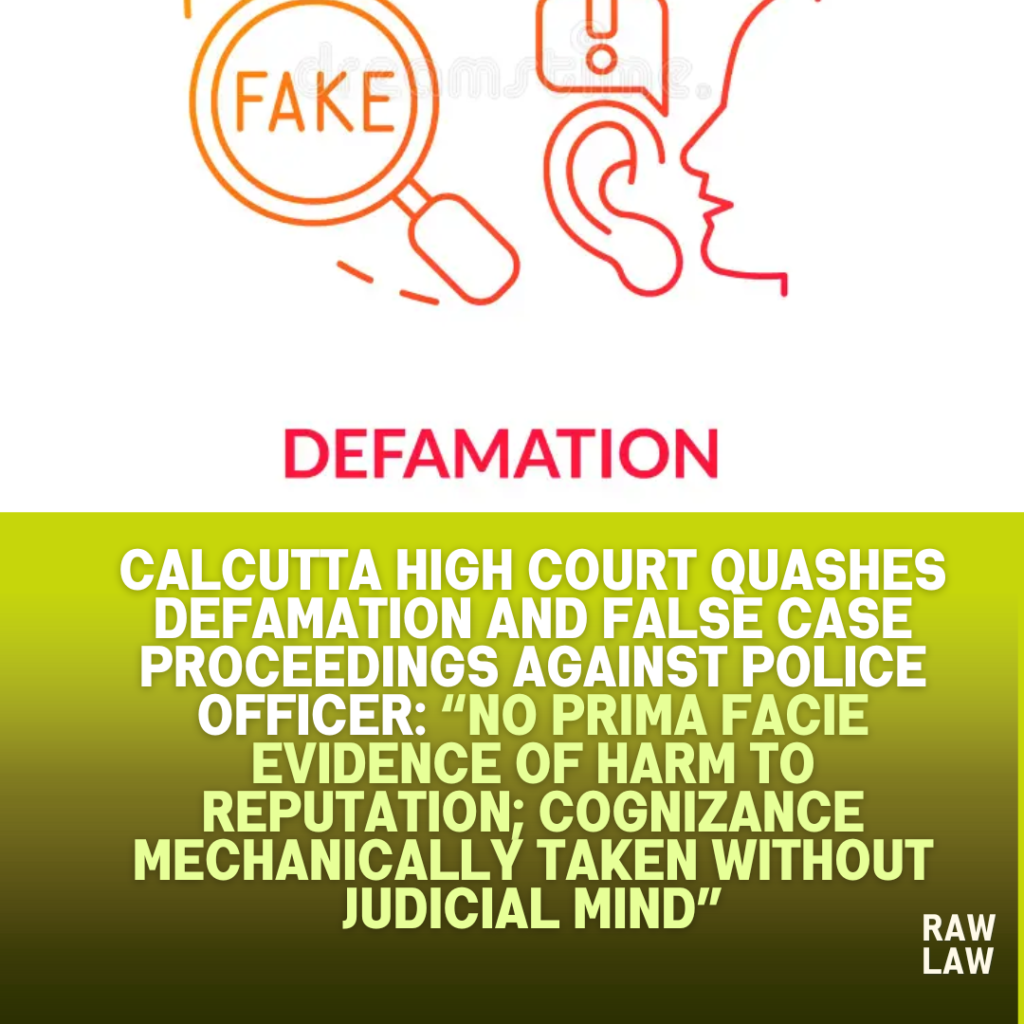Judgment Title: Prabir Roy v. Parag Mukherjee
Court’s Decision
The Calcutta High Court allowed two criminal revision applications and quashed:
- Complaint Case No. C/11369/2011 pending before the 9th Judicial Magistrate, Alipore, initiated under Sections 219/500/34 IPC.
- Proceedings under Section 340 Cr.P.C. before the Sub-Divisional Magistrate, Alipore.
The Court held that there was no prima facie case made out against the petitioner for defamation or other offences, and the Magistrate had mechanically issued process without application of judicial mind and without conducting the mandatory inquiry under Section 202 Cr.P.C.
Facts
A police officer submitted a report under Section 107 Cr.P.C., describing the complainant—a practicing advocate—as “dangerous and desperate in nature” in the context of a property dispute. The report led to a Section 107 Cr.P.C. proceeding, which was later quashed by the High Court.
The complainant alleged that the police officer’s report damaged his professional reputation, leading to loss of clients and public embarrassment. Consequently, he filed a criminal complaint under Sections 219, 500, and 34 IPC, and sought prosecution under Section 340 Cr.P.C.
Issues
- Whether the complaint disclosed ingredients necessary to make out an offence under Sections 219, 500, 34 IPC?
- Whether the Magistrate rightly exercised discretion in issuing process?
- Whether the complainant demonstrated mens rea and actual harm to reputation?
- Whether the proceedings violated Section 202 Cr.P.C.?
Petitioner’s Arguments
The petitioner argued:
- Even accepting the complainant’s case at face value, no offence was made out.
- The police report was filed in discharge of official duty.
- No specific imputation or mens rea was alleged or proven.
- The Magistrate issued summons mechanically without satisfying the mandatory conditions under Section 202 Cr.P.C.
- The entire proceeding was initiated to harass the petitioner and was an abuse of process.
Respondent’s Arguments
The complainant contended:
- The petitioner, a police officer, acted maliciously and intentionally to harm his reputation.
- The label “desperate and dangerous” caused reputational damage in the legal fraternity and among clients.
- As a result, he lost clients and suffered professionally.
- Therefore, offences under Sections 219 and 500 IPC were clearly made out.
Analysis of the Law
The Court analysed the legal ingredients of defamation under Section 499 IPC:
- There must be an imputation with mens rea to harm reputation.
- Actual harm must be proven or reasonably inferred.
- Filing a police report in the course of duty is not per se defamatory unless proven to be malicious.
Precedent Analysis
- Subramanian Swamy v. Union of India [(2016) 7 SCC 221]:
- Mens rea is essential for defamation.
- Mere imputation is not enough without intent to harm.
- Dipankar Bagchi v. State of West Bengal [(2010) 1 CCR.L.R. (Cal) 403]:
- Defamation requires proof that moral or intellectual character was lowered in others’ estimation.
- Defamation requires proof that moral or intellectual character was lowered in others’ estimation.
- M/s Nishka Properties (Pvt.) Ltd. v. State of West Bengal [(2014) 1 AICLR 1018]:
- Defamation is not made out unless intention to defame is clearly evident.
- Defamation is not made out unless intention to defame is clearly evident.
- State of Haryana v. Bhajan Lal [1992 Supp (1) SCC 335]:
- Categories for quashing of proceedings under Section 482 Cr.P.C. were invoked—especially (1), (3), and (7).
Court’s Reasoning
- The Magistrate had applied no judicial mind while issuing process. The use of a printed pro forma order with sections filled in by hand demonstrated mechanical action.
- No independent witnesses were examined by the complainant under Section 200 Cr.P.C.
- Mandatory inquiry under Section 202 Cr.P.C. was not conducted, despite accused residing outside jurisdiction.
- There was no evidence that the statement in the police report caused actual harm to reputation in public estimation.
- The proceedings appeared motivated by personal vengeance rather than public interest.
Conclusion
The High Court quashed both the criminal complaint and the proceeding under Section 340 Cr.P.C. against the petitioner. It held that the complainant failed to establish even a prima facie case of defamation or other offences.
Implications
- Reinforces that mens rea and actual harm are prerequisites for defamation prosecution.
- Clarifies that judicial officers must apply their mind while taking cognizance—mere mechanical action is insufficient.
- Protects public servants from vexatious litigation arising out of discharge of official duties.
- Mandates strict compliance with Section 202 Cr.P.C. when issuing summons to persons outside jurisdiction.
Summary of Cases Referred
- Subramanian Swamy v. Union of India: Affirmed that intention to harm reputation is central to defamation.
- Dipankar Bagchi: Clarified that harm to reputation must be proven through witnesses.
- M/s Nishka Properties Pvt. Ltd.: Mens rea is a precondition for defamation.
- State of Haryana v. Bhajan Lal: Laid down illustrative categories for quashing criminal proceedings under Section 482 Cr.P.C.



